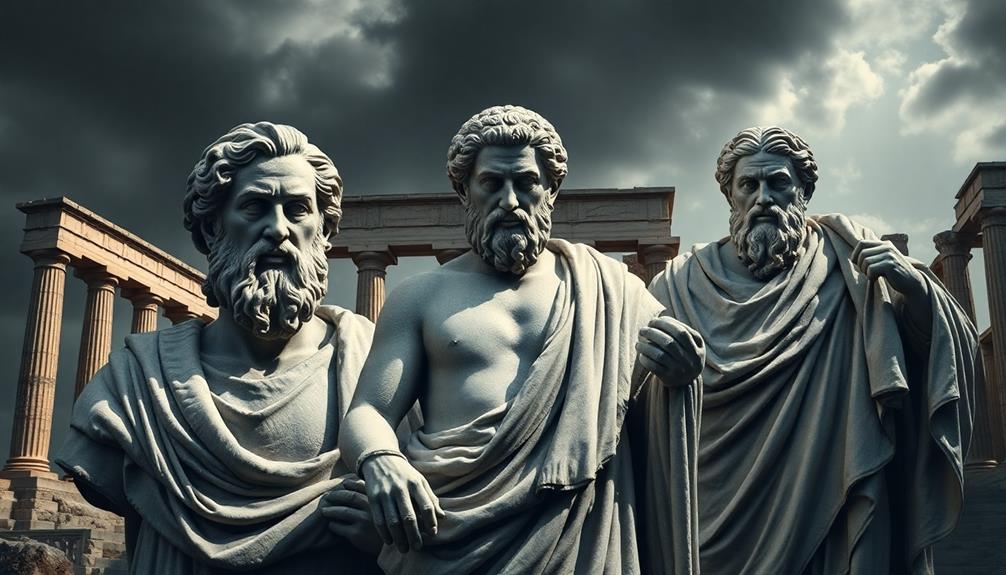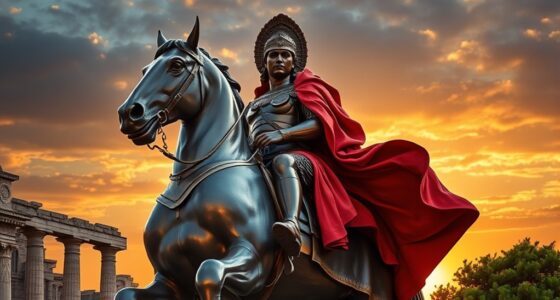When you explore ancient Greek history, you'll find figures like Socrates, who faced death for his unyielding questioning of morality. Alcibiades, known for his charm, shifted loyalties during the Peloponnesian War, creating chaos. Diogenes challenged societal norms with his eccentric lifestyle, while Aspasia broke boundaries as a foreign intellectual in Athenian society. Historians like Herodotus and Thucydides introduced new methods but stirred debates with their differing perspectives. These individuals illustrate the tensions between power, philosophy, and ethics. If you're curious about how they influenced later thought, there's much more to uncover about their legacies and controversies.
Key Takeaways
- Socrates faced trial for impiety and corrupting youth, sparking debates on morality and individual rights in ancient Greece.
- Diogenes challenged societal norms, living in a barrel and rejecting materialism, which provoked both admiration and disdain.
- Pythagoras's secretive society and the authenticity of his mathematical ideas raised questions about his contributions and their origins.
- Alcibiades, with shifting loyalties during the Peloponnesian War, exemplified the tension between aristocratic ambitions and democratic values.
- Antigone's defiance against King Creon highlighted the struggle between individual conviction and state authority, marking her as a feminist icon.
Alcibiades: The Flawed Hero
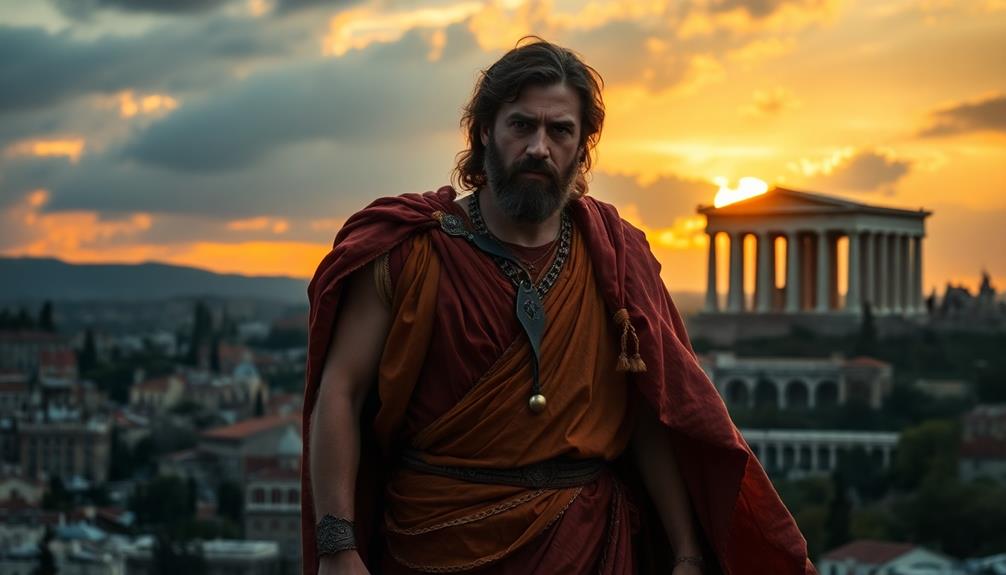
Alcibiades stands out as one of the most polarizing figures in ancient Greek history. Born into an aristocratic family in 452 BC, you can't help but notice his beauty and charisma that captivated many.
Yet, Alcibiades' political career is steeped in controversy, marked by brilliance and betrayal. During the Peloponnesian War, he played a pivotal role in Athenian military successes, regaining morale for the fleet and leading strategic victories. However, his shifting loyalties—defecting to the Spartans and Persians—caused significant turmoil, showcasing the duality of his capabilities.
His relationships with prominent thinkers like Socrates reflect his philosophical pursuits, but they also highlight the tension between his aristocratic ambitions and the democratic values of Athens.
As you explore deeper into Alcibiades' life, you realize that his actions often mirrored the complexities of ambition and loyalty, ultimately leading to his assassination in 404 BC.
This tragic end leaves you contemplating his legacy, one of both admiration and disdain. Alcibiades embodies the flawed hero, illustrating the intricate nature of power and the consequences of choices in ancient Greece.
Socrates: The Questioning Philosopher
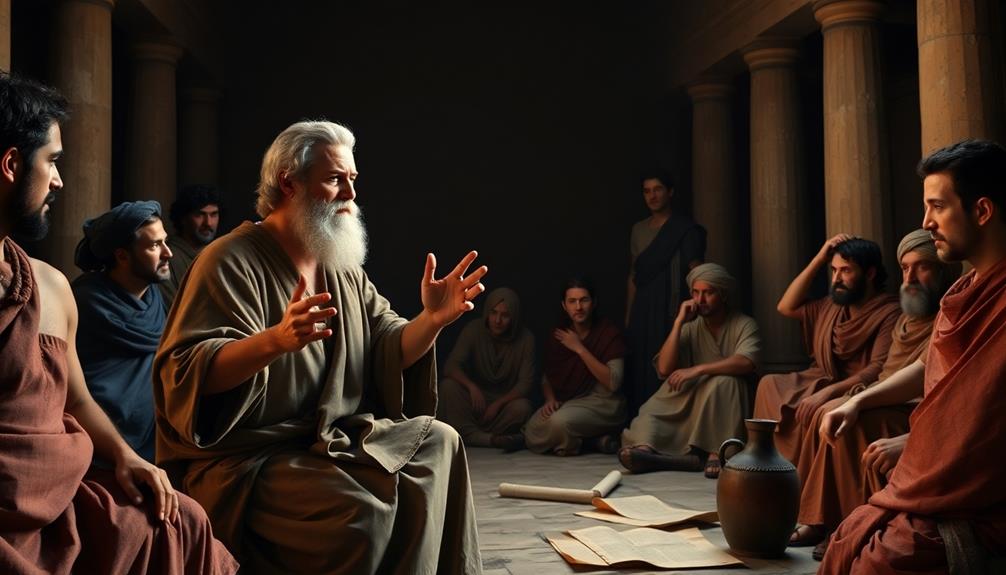
Socrates, often hailed as one of the foundational figures of Western philosophy, revolutionized the way we think about ethics and knowledge. Born in Athens in 470 BC, he's best known for the Socratic Method, a technique that uses probing questions to encourage critical thinking.
You might find it fascinating that he never wrote anything down; instead, his ideas were preserved through the works of his students, like Plato and Xenophon.
Socrates championed the pursuit of virtue and knowledge, famously declaring that "the unexamined life isn't worth living." This emphasis on self-reflection laid the groundwork for future philosophical inquiry.
However, his relentless questioning didn't sit well with everyone. In 399 BC, he faced trial for impiety and corrupting the youth of Athens, leading to his death sentence by hemlock.
His execution ignited intense debates about morality, justice, and individual rights, establishing Socrates as a martyr for free speech and intellectual inquiry.
Even today, his legacy continues to inspire and challenge you to examine your beliefs and values, making him one of the most controversial figures in ancient Greek history.
Diogenes: The Cynical Iconoclast

When you think of Diogenes, you can't help but picture the man living in a barrel, challenging the norms of society.
His philosophy of Cynicism pushes you to reconsider what it means to live virtuously, stripped of material excess.
Philosophy of Cynicism
The philosophy of Cynicism, exemplified by Diogenes of Sinope, challenges societal norms and materialism through a lens of radical authenticity. Diogenes lived a life that starkly opposed the values of his time, advocating for simplicity and natural living. His infamous public acts, like carrying a lantern in daylight to find an honest man, serve as a powerful critique of societal dishonesty.
| Cynical Actions | Societal Norms Challenged |
|---|---|
| Living in a ceramic jar | Materialism and luxury |
| Disrupting Plato's lectures | Abstract versus practical wisdom |
| Requesting Alexander to move | Power dynamics and authority |
| Emphasizing self-sufficiency | Dependency on society |
| Rejecting social conventions | Conformity and acceptance |
Through these actions, you see Diogenes embodying Cynicism, promoting independence from societal expectations. His legacy continues to inspire modern thought, urging you to embrace authenticity and self-sufficiency. In a world where materialism often reigns, Diogenes reminds you to question the status quo and seek virtue through simplicity.
Life in a Barrel
Rejection of societal expectations defines Diogenes of Sinope, whose choice to live in a large ceramic jar exemplifies his radical critique of materialism. By opting for such an unconventional dwelling, you see how Diogenes challenged the Athenian norms surrounding property and comfort. His lifestyle was a bold statement against the excesses of society, symbolizing his belief that true happiness comes from simplicity.
You might find it fascinating that Diogenes often engaged in provocative acts to express his philosophy. Eating in the marketplace and carrying a lantern during the day to search for an "honest man" showcased his disdain for hypocrisy. When he saw a peasant drinking from his hands, he famously destroyed his bowl, declaring he no longer needed it, further emphasizing his commitment to minimalist living.
His encounters with other philosophers, including a notable meeting with Alexander the Great, highlight his fearless approach to authority. When Alexander offered to grant him any wish, Diogenes simply asked him to "stand out of the sunlight," illustrating his indifference to power and privilege.
Ultimately, Diogenes of Sinope remains a compelling figure, whose life in a barrel continues to inspire discussions on authenticity and societal norms.
Critique of Society
Diogenes of Sinope stands as a striking example of a philosopher who didn't just critique society—he actively dismantled its pretensions. Living in a ceramic jar, he championed simplicity and rejected the materialism that dominated Athenian culture. You can see his disdain for unnecessary luxury when he famously destroyed his bowl after observing a peasant drinking from his hands. For Diogenes, life's essentials were far more important than societal norms.
His provocative actions often blurred the lines of social acceptability. Eating in the marketplace and wandering with a lamp in search of "an honest man" were just a few ways he challenged Athenian values. Diogenes also took aim at philosophical elites, mocking Plato's abstract theories and emphasizing practical wisdom instead.
One of his most iconic moments came during an encounter with Alexander the Great. Instead of seeking favor from the powerful ruler, he merely asked Alexander to step aside and let him enjoy the sunlight.
This encounter encapsulated Diogenes of Sinope's radical approach to life—a life dedicated to exposing the hypocrisy of society while advocating for authenticity and freedom from societal constraints.
Herodotus: The Father of History

Herodotus emerges as a pivotal figure in the landscape of ancient history, often hailed as the "Father of History" for his groundbreaking work, "Histories." Born in Halicarnassus around 484 BC, he crafted a systematic narrative that chronicles the Greco-Persian Wars and explores the cultures and customs of various peoples.
His innovative approach laid the groundwork for historical writing, blending inquiry with storytelling in a way that engaged readers.
Despite his acclaim, you'll find that later historians criticized Herodotus for being overly anecdotal and sometimes unreliable. Yet, his vivid storytelling and detailed observations of different cultures offer invaluable insights into ancient Greece and beyond.
- He pioneered the method of gathering information from multiple sources.
- His ethnographic notes enriched our understanding of diverse societies.
- Herodotus's narrative style influenced both history and literature.
- His work remains a reflection of the complexity of human behavior.
Through his efforts, you can see how Herodotus shaped our understanding of history, making him a figure that continues to spark debate and admiration in the study of ancient Greece.
Thucydides: The Realist Historian
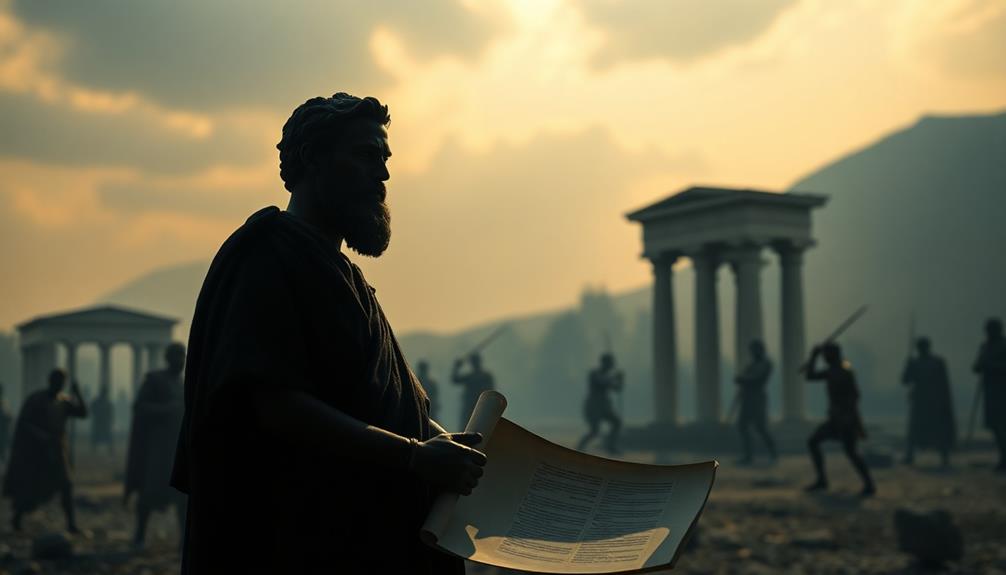
Thucydides revolutionized historical methodology by emphasizing factual accuracy and critical analysis in his accounts.
His realist perspective on power dynamics and human nature reshaped how you might think about political analysis and historical events.
With his influence extending into modern historiography, you can see echoes of his ideas in the works of later thinkers like Machiavelli and Hobbes.
Historical Methodology and Sources
The critical lens of Thucydides revolutionized how history is recorded and understood, establishing a methodology that prioritizes direct observation and eyewitness accounts. His approach provides invaluable insights into human behavior and political dynamics, setting a standard for historical methodology that still resonates today.
In "History of the Peloponnesian War," he meticulously documents the conflict between Athens and Sparta, focusing on the motivations and decisions of historical figures without relying on divine explanations.
Consider these key aspects of his methodology:
- Emphasis on empirical evidence over myths or legends.
- Analysis of human nature as self-interested and power-driven.
- Acknowledgment of the complex interplay between politics and war.
- Development of a secular lens for understanding historical events.
Realism in Political Analysis
In examining the intricate dynamics of power and politics, Thucydides stands out as a pivotal figure in the development of realist political analysis. His seminal work, "History of the Peloponnesian War," emphasizes factual accuracy and human agency, setting a distinct contrast to mythological narratives.
You'll find that Thucydides' approach lays the groundwork for realism in political theory, focusing on the interplay of power rather than moral or ideological considerations. He introduced the concept of "realpolitik," urging decision-makers to prioritize pragmatic strategies shaped by power dynamics.
Through his analysis of the Peloponnesian War, you see how fear, honor, and self-interest drive both states and individuals, offering a sobering view of human nature in conflict. This focus on realism reveals a deep understanding of how emotions influence political actions.
Thucydides' rigorous methodology, marked by critical scrutiny and empirical evidence, has influenced scholars for centuries, setting a standard for both historical and political analysis.
As you explore his work, you'll appreciate how Thucydides' insights into realism continue to resonate in contemporary discussions about international relations and political behavior.
Influence on Modern Historiography
Realism in historiography owes much to Thucydides, whose rigorous approach transformed how history is recorded and understood.
By emphasizing empirical evidence and critical analysis, he set the stage for modern historians to adopt a more realistic perspective. Thucydides rejected mythological explanations and focused on rational interpretations of human actions, especially in the context of power struggles.
His methodology, which included firsthand accounts and eyewitness testimonies, encourages you to prioritize primary sources over secondary narratives. This shift in focus has had lasting impacts on how history is approached today.
Consider these key points about Thucydides' influence:
- He demonstrated the importance of evidence-based history.
- His exploration of power dynamics remains relevant in political analysis.
- Thucydides prompted historians to examine ethical dimensions in their work.
- His insights into human nature drive ongoing discussions about political behavior.
Aspasia: The Influential Companion

Aspasia, a remarkable figure in ancient Athens, captivated many with her intellect and influence as the companion of statesman Pericles. Originally from Miletus, Aspasia became a significant player in Athenian society during its Golden Age. Known for her sharp mind and eloquence, she engaged in philosophical discussions and contributed to the evolution of rhetoric. Some accounts even credit her with influencing the teachings of Socratic philosophy.
However, Aspasia faced considerable criticism due to her status as a foreigner, which challenged Athenian ideals of citizenship and propriety. Despite this, her impact on Pericles was undeniable; historical records suggest she played an essential role in shaping his policies and public speeches, marking her as a key advisor in Athenian politics.
Aspasia's legacy remains a powerful symbol of women's intellectual contributions in ancient Greece, even amid societal constraints. Her story inspires later feminist discourse, highlighting the potential for women to influence public life.
In a world where their voices were often silenced, Aspasia emerged as a beacon of intellect and authority, leaving an indelible mark on history.
Pericles: The Visionary Leader
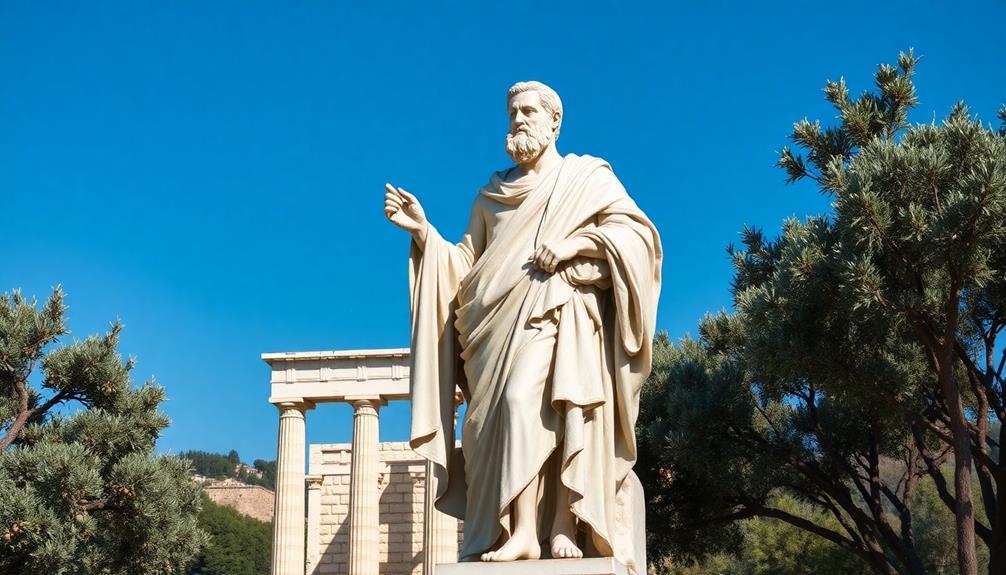
Pericles stands out as one of the most influential figures in ancient Athens, shaping the city's political and cultural identity during its Golden Age. As a prominent statesman and general, he led Athens from about 461 to 429 BC, steering it towards unprecedented heights. Under Pericles, the city became a hub of arts, philosophy, and democracy, setting the standard for future generations.
His initiatives included:
- Championing the construction of the Parthenon, symbolizing Athenian democracy.
- Introducing pay for public officials, enabling lower-class citizens to engage in governance.
- Fostering a flourishing cultural scene, making Athens the ancient world's intellectual epicenter.
- Developing a naval strategy during the Peloponnesian War, despite facing significant challenges.
Pericles' leadership not only transformed Athens into a cultural beacon but also sparked debates on democracy's evolution.
While his strategies and policies had profound impacts, they also invited controversy, particularly during wartime.
You can't overlook how Pericles' vision shaped the foundations of Western civilization, influencing governance and artistic expression long after his time.
His legacy remains both celebrated and contested, reflecting the complexities of leadership in a democratic society.
Antigone: The Defiant Daughter

Few figures in ancient literature embody the struggle between individual conviction and state authority as powerfully as Antigone. As the daughter of Oedipus, she defies King Creon's decree to bury her brother Polyneices, labeled a traitor. This act of loyalty to her family over the state showcases Antigone's moral fortitude and commitment to divine law.
| Aspect | Antigone's Actions | Consequences |
|---|---|---|
| Defiance | Buries Polyneices | Arrested by Creon |
| Moral Duty | Asserts divine law over human law | Sentenced to entombment alive |
| Feminist Icon | Resists patriarchal authority | Symbol of individual rights |
In her confrontation with Creon, Antigone emphasizes the importance of moral duty, challenging the very fabric of state law. Ultimately, her unwavering commitment to her principles leads to her tragic demise, making her a poignant figure in literature. Sophocles' play continues to resonate, prompting discussions on personal conviction versus state authority, and highlighting Antigone's role as a powerful voice for individual rights throughout history.
Pythagoras: The Mystic Mathematician

Often regarded as one of the most influential figures in ancient mathematics and philosophy, Pythagoras emerged around 570 BC on the island of Samos. You might know him best for the Pythagorean theorem, a fundamental principle in geometry. However, Pythagoras' impact stretches far beyond math; he founded a religious movement called Pythagoreanism, blending mathematics, philosophy, and spirituality.
- He believed in the immortality of the soul and reincarnation.
- Pythagoreans adhered to strict dietary choices, often practicing vegetarianism.
- His teachings emphasized harmony and order in both life and the universe.
- Pythagoras also contributed to music theory by discovering mathematical relationships in musical intervals.
Despite his notable contributions, Pythagoras faced controversies. The secretive nature of his society often obscured the origins of his ideas, leading many to question the authenticity of his mathematical discoveries.
Some scholars argue that he borrowed concepts from earlier thinkers. Nevertheless, Pythagoras remains a pivotal figure, illustrating how mathematics can intertwine with philosophy and spirituality, shaping not just numbers, but the very understanding of existence itself.
Frequently Asked Questions
Who Was the Most Controversial Greek Philosopher?
You might find Diogenes of Sinope to be the most controversial Greek philosopher. He challenged social norms, lived in a jar, and advocated for simplicity, often provoking others with his bold actions and disdain for materialism.
Who Is the Most Tragic Figure in Greek History?
Alcibiades is a tragic hero, a ship tossed in a storm, steering through shifting loyalties and ambition. His brilliance and betrayal led to glory and doom, encapsulating the costs of power in Greek history.
Who Was the Most Influential Figure in Ancient Greece?
You might consider Pericles as the most influential figure in ancient Greece. His leadership during Athens' Golden Age spurred cultural, political, and military advancements, shaping democratic principles and leaving a lasting legacy that resonates throughout history.
Who Were the Bad Greek Rulers?
You'll find rulers like Cypselus and Dionysius of Syracuse viewed negatively for their oppressive tactics. While they initially gained support through reforms, their eventual tyranny shaped perceptions of leadership in ancient Greece and beyond.
Conclusion
In the grand theater of ancient Greece, these figures danced in the spotlight, each wielding their own brand of controversy like a shield. Ironically, their flaws and defiance painted a vivid mural of humanity, proving that even heroes can stumble and philosophers can question too much. As you ponder their legacies, remember: the very traits that ignited debates and divided opinions are what make them eternally relevant. After all, isn't it the chaos of ideas that truly shapes history?
